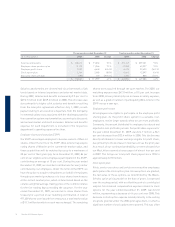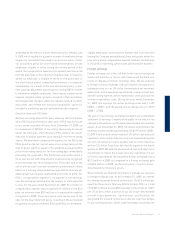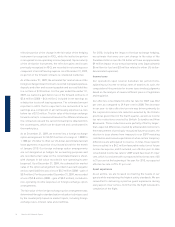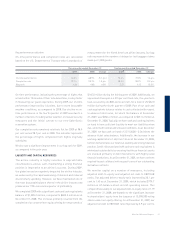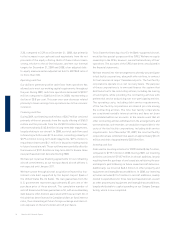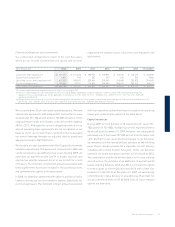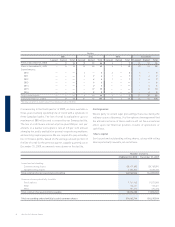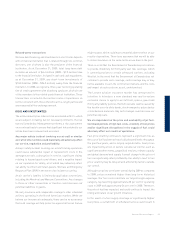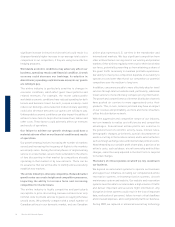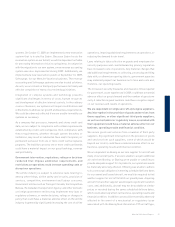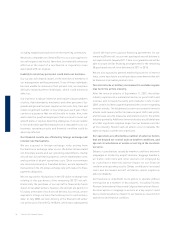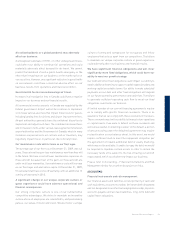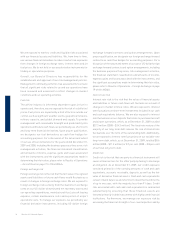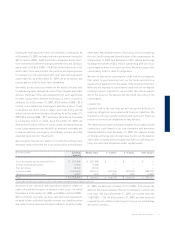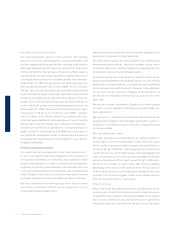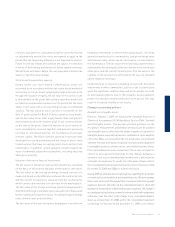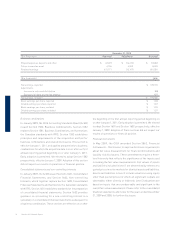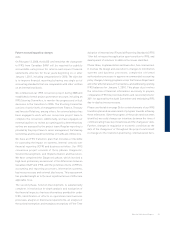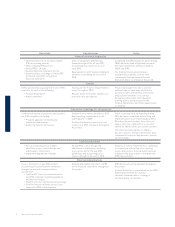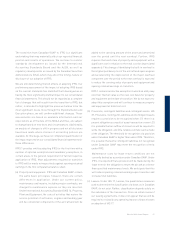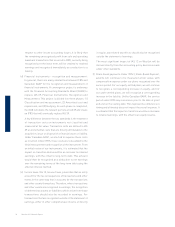Westjet 2009 Annual Report Download - page 58
Download and view the complete annual report
Please find page 58 of the 2009 Westjet annual report below. You can navigate through the pages in the report by either clicking on the pages listed below, or by using the keyword search tool below to find specific information within the annual report.
28 WestJet 2009 Annual Report
closed. We have yet to pursue fi nancing agreements for our
remaining 38 aircraft, as our next purchased aircraft delivery is
not expected until January 2011. There is no guarantee we will be
able to secure similar fi nancing arrangements for the remaining
38 purchased aircraft to be delivered in 2011 to 2016.
We are also exposed to general market fl uctuations of interest
rates, as we have future aircraft purchase commitments that will
be fi nanced at prevailing market rates.
Terrorist attacks or military involvement in unstable regions
may harm the airline industry.
After the terrorist attacks of September 11, 2001, the airline
industry experienced a substantial decline in guest traffi c and
revenue, and increased security and insurance costs. In late
2009, certain incidents again heightened the concern regarding
terrorist attacks. The heightened concern over potential terrorist
attacks could cause a further decrease in guest traffi c and yields,
and increase security measures and related costs for the airline
industry generally. Additional terrorist attacks would likely have
a further signifi cant negative impact on our business and the
airline industry. Should such an attack occur in Canada, the
adverse impact could be very signifi cant.
Our operations are affected by a number of external factors
that are beyond our control such as weather conditions, and
special circumstances or events occurring in the locations
we serve.
Delays or cancellations caused by weather conditions and work
stoppages or strikes by airport workers, baggage handlers,
air traffic controllers and other workers not employed by
us could have a material adverse impact on our financial
condition and operating results. Delays contribute to increased
costs and decreased aircraft utilization, which negatively
affect profi tability.
Our business is dependent on its ability to operate without
interruption at a number of key airports, including Toronto
Pearson International Airport and Calgary International Airport.
An interruption or stoppage in service at a key airport could
have a material adverse impact on our business, results from
operations and fi nancial condition.
including negative perceptions from the travelling community.
We are also dependent on General Electric as a sole supplier for
aircraft engines and would, therefore, be materially adversely
affected in the event of a mechanical or regulatory issue
associated with our engines.
Inability to retain key personnel could harm our business.
Our success will depend, in part, on the retention of members of
our management and key personnel. If any of these individuals
become unable to continue in their present role, we may have
diffi culty replacing these individuals, which could adversely
affect us.
Our business is labour-intensive and requires large numbers
of pilots, fl ight attendants, mechanics and other personnel. Our
growth and general turnover requires us to locate, hire, train and
retain a signifi cant number of new employees each year. There
can be no assurance that we will be able to locate, hire, train
and retain the qualifi ed employees that we need to meet our
growth plans or replace departing employees. If we are unable
to hire and retain qualifi ed employees at a reasonable cost, our
business, operating results and fi nancial condition could be
adversely affected.
Our fi nancial results are affected by foreign exchange and
interest rate fl uctuations.
We are exposed to foreign exchange risks arising from
fl uctuations in exchange rates on our US-dollar-denominated
net monetary assets and our operating expenditures, mainly
aircraft fuel, aircraft leasing expense, certain maintenance costs
and a portion of airport operations costs. Since our revenues
are received primarily in Canadian dollars, we are exposed to
fl uctuations in the US-dollar exchange rate with respect to these
payment obligations.
We are exposed to fl uctuations in the US-dollar exchange rate
relating to the purchases of the remaining 38 737 aircraft.
Historically the purchase of our aircraft is fi nanced by funds
drawn in Canadian dollars; however, the aircraft are paid for in
US funds at the date of each aircraft delivery. As a result, we are
exposed to foreign currency fl uctuations prior to each delivery
date. In July 2008, we took delivery of the fi nal aircraft under
our previous facility with Ex-Im Bank, which was subsequently


